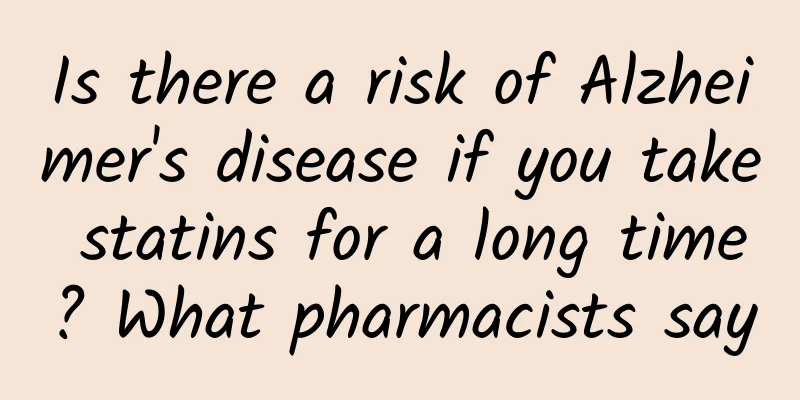Is there a risk of Alzheimer's disease if you take statins for a long time? What pharmacists say

|
A friend told Huazi that he saw someone say, "People who take statins have a 140% higher risk of developing Alzheimer's disease than those who do not take statins." He asked Huazi to confirm whether this statement was true. Huazi searched for the keywords he mentioned, but did not find the information he mentioned. However, he found relevant information from June last year, which showed that statins were not associated with the risk of Alzheimer's disease, mild cognitive impairment (MCI), and changes in cognitive function. The University of Tasmania in Australia published a study in the top cardiovascular journal, the Journal of the American College of Cardiology (JACC), in June last year. 1. Controversy over the effects of statins on Alzheimer's disease Statins are the most widely used lipid-regulating drugs. Their main function is to inhibit the production of cholesterol, stabilize atherosclerotic plaques, and even reverse them. Long-term use of statins is an effective way to reduce the incidence of cardiovascular and cerebrovascular diseases. Statins have certain side effects during use. The main one is the impact on liver function, and transaminases (AST, ALT) need to be monitored during medication. They may cause muscle damage, myalgia, and fatigue, and creatine kinase (CK) needs to be monitored. They may also cause elevated blood sugar and induce diabetes. However, there has been a lot of controversy about the effects of statins on Alzheimer's disease and cognitive function. In 2012, the U.S. Food and Drug Administration (FDA) pointed out that "statins may induce reversible cognitive dysfunction, such as memory loss." However, recent research results vary greatly and are not enough to prove that the two are related. There are many factors that affect the test results, such as drug properties, age, race, comorbidities, genetic factors, etc., which can all have an impact. In addition, there have been results from other tests before, showing that statins can reduce the risk of Alzheimer's disease. Therefore, there are many controversies surrounding the relationship between statins and Alzheimer's disease. 2. Statins may have an impact on cognitive ability. In fact, ever since the emergence of statins, people have been worried that lowering cholesterol will affect brain function. Too low cholesterol cannot maintain the normal functioning of brain cells, which may lead to cognitive impairment and Alzheimer's disease. However, people who use statins are themselves elderly people with dyslipidemia, and are also a high-risk group for Alzheimer's disease. It is difficult to prove that there is an inevitable causal relationship between statins and Alzheimer's disease. Cerebral infarction can also lead to cognitive decline, and statins can reduce plaque rupture, have anti-inflammatory effects, reduce the risk of cerebral vascular blockage, and have a protective effect on cerebral blood vessels. Statins can prevent cerebral infarction, especially small, recurrent cerebral infarction, thereby playing a role in preventing dementia. Other studies have also shown that statins are associated with a reduced risk of Alzheimer's disease and can reduce the risk of death in patients with Alzheimer's disease. But so far, there has been no authoritative, substantial research on the effects of statins on cognitive ability that can be recognized by most people. In summary, the impact of statins on Alzheimer's disease is only controversial now, and there is no definite answer. However, in the decades of statin use, the role of reversing atherosclerosis and preventing cerebral infarction and myocardial infarction is unquestionable. People with cardiovascular and cerebrovascular risks will definitely benefit more from taking statins than from taking them. There will definitely be more evidence in the future, but we don't need to worry about it now. Living in the present, taking medicine regularly according to doctor's orders, and preventing cardiovascular and cerebrovascular diseases are the most important things. If you have any questions about medication, please consult a doctor or pharmacist. I am pharmacist Huazi. Welcome to follow me and share more health knowledge. |
<<: Say goodbye to thick glasses, a girl with 700-degree myopia cured her myopia without surgery
>>: What are the benefits of red bean and barley tea? Is red bean and barley tea cooling or hot?
Recommend
A woman dreams of dyeing her hair
The scenes in dreams are always varied and usuall...
Can I still get pregnant after having one fallopian tube removed?
Many women have diseases in one of their fallopia...
The secret to health: control your diet and move your legs!
Overeating can damage your stomach, so you should...
How much does ectopic pregnancy surgery cost?
At present, the treatment of ectopic pregnancy ca...
What are the vulva disinfectants?
The female genitals are an area where bacteria ar...
What should pregnant women pay attention to in their diet?
When you are 6 months pregnant, your mother's...
Is it okay for a pregnant woman to pick her belly button?
After a woman becomes pregnant, her belly button ...
Why do I feel back pain after egg retrieval?
What is the general reason for lower back pain af...
What is the process of artificial insemination?
Nowadays, people are under great pressure in life...
What does uneven echo in the breast mean?
If the echo inside the breast is uneven, it means...
How to correct accessory breast
If the accessory breasts are very serious, they n...
Can I have sex the day before my period?
Many couples who are preparing for pregnancy want...
Jumio: Survey shows that 66% of consumers abandon shopping due to mobile payment process problems
With the development of mobile e-commerce, 68% of...
The pain on the fifth day of medical abortion is like dysmenorrhea
There are several situations in which the pain on...
I have my period for three days and only have a little blood
For female friends, menstruation is not unfamilia...









